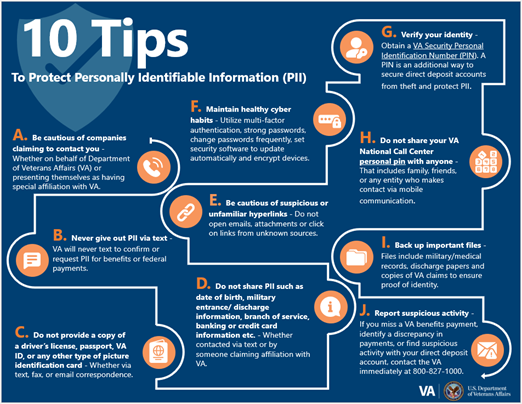A. Be cautious of companies claiming to contact you – Whether on behalf of Department of Veterans Affairs (VA) or presenting themselves as having special affiliation with VA.
B. Never give out PII via text – VA will never text to confirm or request PII for benefits or federal payments.
C. Do not provide a copy of a driver’s license, passport, VA ID, or any other type of picture identification card – Whether via text, fax, or email correspondence.
D. Do not share PII such as date of birth, military entrance/discharge information, branch of service, banking or credit card information etc. – Whether contacted via text or by someone claiming affiliation with VA.
E. Be cautious of suspicious or unfamiliar hyperlinks – Do not open emails, attachments or click on links from unknown sources.
F. Maintain healthy cyber habits – Utilize multi-factor authentication, strong passwords, change passwords frequently, set security software to update automatically and encrypt devices.
G. Verify your identity – Obtain a VA Security Personal Identification Number (PIN). A PIN is an additional way to secure direct deposit accounts from theft and protect PII.
H. Do not share your VA National Call Center personal pin with anyone – That includes family, friends, or any entity who makes contact via mobile communication.
I. Back up important files – Files include military/medical records, discharge papers and copies of VA claims to ensure proof of identity.
J. Report suspicious activity – If you miss a VA benefits payment, identify a discrepancy in payments, or find suspicious activity with your direct deposit account, contact the VA immediately at 800-827-1000.


